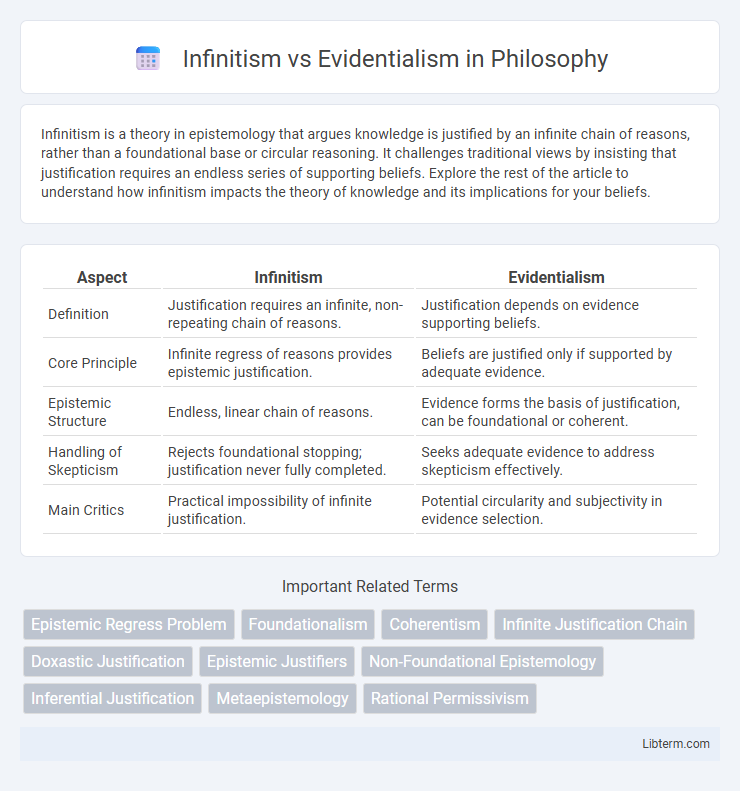Infinitism is a theory in epistemology that argues knowledge is justified by an infinite chain of reasons, rather than a foundational base or circular reasoning. It challenges traditional views by insisting that justification requires an endless series of supporting beliefs. Explore the rest of the article to understand how infinitism impacts the theory of knowledge and its implications for your beliefs.
Table of Comparison
| Aspect | Infinitism | Evidentialism |
|---|---|---|
| Definition | Justification requires an infinite, non-repeating chain of reasons. | Justification depends on evidence supporting beliefs. |
| Core Principle | Infinite regress of reasons provides epistemic justification. | Beliefs are justified only if supported by adequate evidence. |
| Epistemic Structure | Endless, linear chain of reasons. | Evidence forms the basis of justification, can be foundational or coherent. |
| Handling of Skepticism | Rejects foundational stopping; justification never fully completed. | Seeks adequate evidence to address skepticism effectively. |
| Main Critics | Practical impossibility of infinite justification. | Potential circularity and subjectivity in evidence selection. |
Introduction to Infinitism and Evidentialism
Infinitism posits that justification for beliefs requires an infinite chain of reasons, where every belief must be supported by another without termination. Evidentialism holds that a belief is justified only if it is supported by sufficient evidence available to the believer, emphasizing finite and accessible grounds. These epistemological theories address how the structure of justification influences knowledge acquisition and rational belief formation.
Defining Infinitism in Epistemology
Infinitism in epistemology posits that knowledge requires an infinite, non-repeating chain of reasons and justification, rejecting the circularity or foundational stopping points found in other theories. This approach contrasts with evidentialism, which holds that beliefs must be supported by adequate evidence, often relying on foundational or coherent structures. Infinitism challenges traditional skepticism by asserting that infinite regress in justification is both possible and necessary for true epistemic justification.
Understanding Evidentialism: Core Principles
Evidentialism asserts that beliefs should be formed and maintained based solely on available evidence, emphasizing justification through empirical data and logical reasoning. This epistemological theory holds that the justification of a belief depends entirely on the evidence supporting it at a given time, rejecting reliance on infinite chains of reasoning characteristic of infinitism. Core principles include the requirement that one must have adequate evidence proportionate to the claim and that beliefs unsupported by evidence are epistemically unjustified.
Key Differences between Infinitism and Evidentialism
Infinitism asserts that justification requires an infinite, non-repeating chain of reasons, whereas evidentialism holds that justification depends on having adequate evidence or reasons supporting a belief. Infinitism rejects foundationalism and coherentism by maintaining no beliefs are self-justified or circularly justified, while evidentialism allows justification through sufficient evidential support, often accepting basic or foundational beliefs. The key difference lies in infinitism demanding an endless regress of justification contrasted with evidentialism's emphasis on the quality and adequacy of evidence to justify beliefs.
Historical Background and Philosophical Roots
Infinitism traces its roots to ancient skepticism, drawing from thinkers like Sextus Empiricus who challenged the possibility of complete justification through infinite chains of reasons. Evidentialism finds philosophical grounding in the works of epistemologists such as William Clifford and C.I. Lewis, emphasizing evidence as the cornerstone of justified belief. Both theories emerged as responses to classical foundationalism and coherentism, shaping contemporary debates on the nature of epistemic justification.
Strengths and Challenges of Infinitism
Infinitism offers a unique strength by avoiding the problem of epistemic circularity and regress, positing that justification requires an infinite, non-repeating chain of reasons, which challenges finite human cognition to attain knowledge. This approach strengthens epistemic justification by allowing for continuous evidence accumulation, fostering an ever-evolving foundation for belief enhancement. However, the main challenge of Infinitism lies in its demand for infinite justification sequences, making practical knowledge acquisition seemingly impossible and raising significant concerns about its implementability in real-world epistemic practices.
Strengths and Challenges of Evidentialism
Evidentialism emphasizes the importance of holding beliefs based strictly on evidence, promoting intellectual rigor and minimizing bias by requiring justification through empirical data and logical reasoning. This approach strengthens critical thinking and supports belief revision when new evidence arises, enhancing reliability in knowledge acquisition. Challenges of evidentialism include difficulties in obtaining conclusive evidence for all beliefs and the potential exclusion of practical or moral considerations that resist empirical validation.
Infinitism vs Evidentialism in Addressing Infinite Regress
Infinitism addresses the problem of infinite regress in epistemology by proposing that justification extends through an infinite, non-repeating chain of reasons, contrasting with Evidentialism, which demands that beliefs be supported by finite, accessible evidence. Unlike Evidentialism, which often faces the challenge of foundational skepticism due to its reliance on a finite set of evidence, Infinitism embraces the infinite regress as a rational and coherent structure for justification. This approach redefines epistemic support by allowing continuous justification without requiring an ultimate foundation or self-evident belief.
Practical Implications in Contemporary Epistemology
Infinitism argues that justification requires an infinite chain of reasons, posing challenges for practical knowledge acquisition in contemporary epistemology due to its demand for endless evidence. Evidentialism, by emphasizing that beliefs must be supported by adequate evidence, offers a more feasible approach for everyday decision-making and scientific inquiry where finite justification suffices. The practical implication favors evidentialism's usability in real-world contexts, balancing epistemic rigor with cognitive limitations.
Conclusion: Evaluating Infinitism and Evidentialism
Infinitism posits that justification requires an infinite, non-repeating chain of reasons, offering a theoretically limitless solution to the regress problem in epistemology. Evidentialism asserts that beliefs are justified solely based on evidence that adequately supports them, emphasizing finite and accessible grounds for knowledge claims. Evaluating both, evidentialism provides a practical framework for justification grounded in empirical evidence, while infinitism challenges traditional constraints by suggesting that justification is an ongoing, infinite process.
Infinitism Infographic

 libterm.com
libterm.com